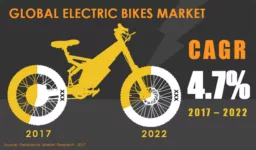In order to meet future mobility needs- cycling is the new driving. To have an effective, efficient and clean living, automotive technologies are working on alternative energy sources that would eventually minimize dependency on fuels and reduce greenhouse gas and toxic emissions. Electric bicycles is one such innovation that resonated with the demand to have proficient mobility technologies. However, studies have shown that if the government and car manufacturers are sincere about revolutionizing the mobility sector, then a robust and sustainable infrastructure has to be created to sustain the electric bicycles market.
According to a recent research, the electric bicycle market is anticipated to be an attractive segment throughout 2022 and is projected to register a CAGR of 4.7%, with China being the key contributor in the electric bicycle segment. In Latin America, favorable business environment and considerably cheaper labor costs are some factors slated to increase investments in electric bicycles market. Owing to emerging technologies and cycling culture, bike genre, most of the key players are launching new products with emphasis on electric bicycles and adventure/mountain bicycles- as more and more users are focused on effortless cycling without breaking a sweat.
To advance the e-mobility revolution, manufacturers and e-retailers need to resolve important issues marring the electric bicycle market, including
- Bicycle weight and infrastructure: For many customers, the heavy weight of the e-bike is currently an issue along with the noise of the motors. Though manufacturers have successfully integrated drive systems and energy sources, weight reduction of electric bicycles and higher range efficiency still need technological improvements. Regarding infrastructure, e-bikers need more coordinated roads to minimize conflicts.
- Charging infrastructure and anti-theft security: From a technical viewpoint, traveling long distance on electric bicycles is still a barrier. Without proper charging areas, batteries often just lasting for a week if used on a plane. If used for mountainous cycling or going 10 to 12 kilometers daily to work, the present battery capacity will not prove to be sufficient. Manufacturers are also considering using bicycle locks and installing GPS sensors in electric bicycles to prevent theft.
Worth Exploring: Electric Bicycles Fast Charging Stations Driven by High-Speed Railway Systems
Since the world is moving towards electrifying transportation that currently accounts for about 70 per cent of total oil demand, the need to have fast-charging station networks for long distance drivers becomes even more important. This means, automobile manufacturers would now have to address concerns about having suitable electric power sources. A possible solution to this demand involves using the high-speed railway line, as it would allow powering a high load and can also be located relatively near the motorway itself.
New Innovations in Progress
An Australia-based company, developing state-of-the-art rectifiers, is currently working on a home charger (11KW DC) for electric vehicles including electric bikes that can quickly recharge a vehicle without the having an onboard charge or needing an external AC charger. The company is also working on a charger that can be wall-mounted- eliminating the need for floor space. This charger would produce very little heat making it ideal for charging stations at indoor spaces such as shopping centres, hotels, and restaurants. This charger is presently being tested by BMW in Germany and USA and also by Siemens, Allego and others.
In a nutshell, like any transformative new technology, Global electric bicycles market will create a sea of economic development opportunities. Market insights included in the article are sourced from Persistence Market Research (PMR) recently published report. Detailed excerpts of the report are available at https://www.persistencemarketresearch.com/samples/18565








